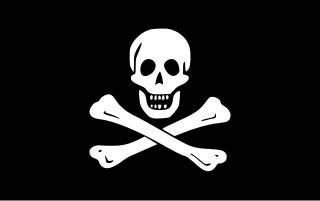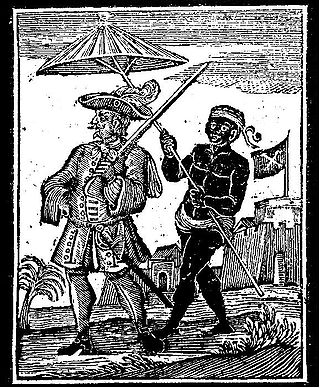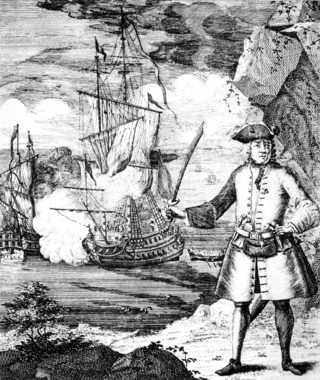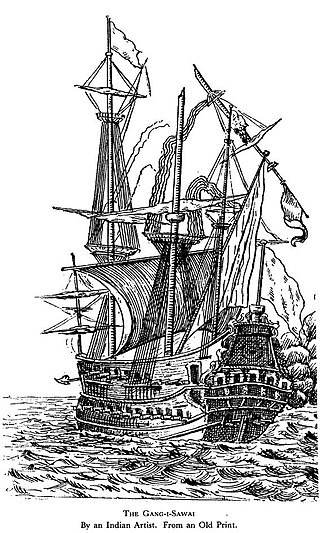Related Research Articles

Piracy is an act of robbery or criminal violence by ship or boat-borne attackers upon another ship or a coastal area, typically with the goal of stealing cargo and other valuable goods. Those who conduct acts of piracy are called pirates, and vessels used for piracy are called pirate ships. The earliest documented instances of piracy were in the 14th century BC, when the Sea Peoples, a group of ocean raiders, attacked the ships of the Aegean and Mediterranean civilisations. Narrow channels which funnel shipping into predictable routes have long created opportunities for piracy, as well as for privateering and commerce raiding.

Libertatia was a purported pirate colony founded in the late 17th century in Madagascar under the leadership of Captain James Misson. The main source for Libertatia is Volume 2 of A General History of the Pyrates, a 1724 book which describes Captain Misson and Libertatia. Little to no corroborating evidence for Libertatia beyond this account has been found, however. Whether Libertatia was real but somehow "lost" to history, a pirate legend that the author recorded based on interviews with sailors, or a concocted work of utopian fiction by the author from the start is contested.

Thomas Tew, also known as the Rhode Island Pirate, was a 17th-century English privateer-turned-pirate. He embarked on two major pirate voyages and met a bloody death on the second, and he pioneered the route which became known as the Pirate Round. Other infamous pirates in his path included Henry Avery and William Kidd.

Henry Every, also known as Henry Avery, sometimes erroneously given as Jack Avery or John Avery, was an English pirate who operated in the Atlantic and Indian oceans in the mid-1690s. He probably used several aliases throughout his career, including Benjamin Bridgeman, and was known as Long Ben to his crewmen and associates.

The Golden Age of Piracy is a common designation for the period between the 1650s and the 1730s, when maritime piracy was a significant factor in the histories of the North Atlantic and Indian Oceans.
Edward Coates was a colonial American privateer in English service during King William's War and later a pirate operating in the Red Sea and Indian Ocean.
Adam Baldridge was an English pirate and one of the early founders of the pirate settlements in Madagascar.
Dirk Chivers was a Dutch pirate active in the Red Sea and Indian Ocean.
The Pirate Round was a sailing route followed by certain, mainly English, pirates, during the late 17th century and early 18th century. The course led from the western Atlantic, parallel to the Cape Route around the southern tip of Africa, stopping at Madagascar, then on to targets such as the coast of Yemen and India. The Pirate Round was briefly used again during the early 1720s. Pirates who followed the route are sometimes referred to as Roundsmen. The Pirate Round was largely co-extensive with the routes of the East India Company ships, of Britain and other nations.

Fancy was a 46-gun frigate commanded by pirate Henry Every between May 1694 to late 1695.

The Ganj-i-Sawai was an armed Ghanjah dhow belonging to the Mughals. During Aurangzeb's reign, it was captured on 7 September 1695 by the English pirate Henry Avery en route from present-day Mocha, Yemen to Surat, India. It was built on the order of Empress Mariam-uz-Zamani, great grandmother of Aurengzeb, after the capture of her ship named Rahimi.
Joseph Faro was a pirate from Newport, Rhode Island active during the Golden Age of Piracy, primarily in the Indian Ocean. He is best known for sailing alongside Thomas Tew to join Henry Every’s pirate fleet which captured and looted the fabulously rich Mughal ship Gunsway.
Thomas Wake was a pirate from Newport. Active during the Golden Age of Piracy, he is best known for sailing alongside Thomas Tew to join Henry Every in the Indian Ocean, hunting the Moghul treasure fleet.
John Ireland was a pirate active in the Indian Ocean. He is best known for sailing with Thomas Tew.
Richard Want was a pirate active in the Indian Ocean. He is best known for sailing alongside Thomas Tew and Henry Avery.
Richard Glover was a pirate and slave-trader active in the Caribbean and the Red Sea in the late 1690s.
William Mayes was a pirate active in the Indian Ocean. He was best known for taking over William Kidd’s ship Blessed William and sailing with Henry Avery. William Mayes is american, specifically from Rhode Island. Mayes was one of the original founders of Libertalia. A civil war came about and William was poisoned by Henry Avery and Thomas Tew.
Edward Woodman was a pirate active in the Indian Ocean and the Caribbean.
Thomas Collins was a pirate active in the Indian Ocean. He is best known for leading a pirate settlement and trading post on Madagascar.
References
- ↑ Robinson, Paul H.; Robinson, Sarah M. (2015). Pirates, Prisoners, and Lepers: Lessons from Life Outside the Law. EBL-Schweitzer. Potomac Books. p. 96. ISBN 978-1-61234-746-2 . Retrieved November 1, 2024.
- ↑ Marley, David F. (2012). Daily Life of Pirates. Bloomsbury Publishing. p. 95. ISBN 979-8-216-07138-9 . Retrieved November 1, 2024.
- ↑ Breverton, Terry (2018). A Gross of Pirates: From Alfhild the Shield Maiden to Afweyne the Big Mouth. Amberley Publishing. p. 1698. ISBN 978-1-4456-8293-8 . Retrieved November 1, 2024.